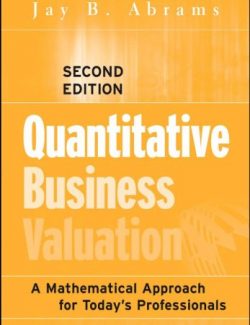Description
Quantitative Business Valuation is the first authoritative work to guide professionals through the business valuation process with a quantitative—as opposed to qualitative—focus.
Jay Abrams’s unique methodology combines original research and mathematical material to lead readers through an integrated approach to forecasting cash flow, calculating discount rates, calculating discounts and premiums, and much more.
This chapter, which discusses the Statement of Cash Flows, is intended for readers who already have a basic knowledge of accounting. Much of what follows will involve alternating between accrual and cash reporting, which can be very challenging material. Also, a parsimonious style has been used to keep the chapter to a reasonable length. Accordingly, certain sections and derivations may require more than one reading.
The primary purpose of a statement of cash flows is to provide relevant information about the cash receipts and cash payments of an enterprise. These receipts and payments must be classified according to three basic types of activities: operating, investing, and financing. Operating activities involve those transactions that enter into the determination of net income.
Examples of these activities are sales of goods or services, purchases of component materials, and compensation of employees. Net income reports these activities when they are earned or incurred. Cash flows from operations reports these activities only when they are collected or paid. For example, net income is increased when a sale is made even though no cash is collected.
Cash flows from operations would reflect the increase only at the time the cash is collected. Also, net income is decreased when, say, insurance expense is incurred even though no payment is made. Cash flows from operations would reflect the decrease only at the time the payment is made













Leave us a comment
No Comments